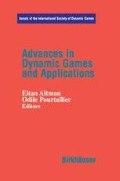Abstract
This paper considers a continuous-time stochastic hybrid system, controlled by two players with opposite objectives (zero-sum game). The parameters of the system may jump at discrete moments of time according to a Markov decision process, namely, a Markov chain that is directly controlled by both players and has finite state and action spaces. Assuming that the length of the intervals between the jumps is defined by a small parameterethe value of this game is shown to have a limit as the small parameter tends to O. This limit is established to coincide with the viscosity solution of some Hamilton—Jacobi-type equations.
Access this chapter
Tax calculation will be finalised at checkout
Purchases are for personal use only
Preview
Unable to display preview. Download preview PDF.
References
Altman E. and Gaitsgory, V. A hybrid (differential-stochastic) zero-sum game with fast stochastic part, inPreprint Volume Sixth Int. Symp. Dynamic Games and Appl.pp. 475–480, St-Jovite, Quebec, July 13–15, 1994.
Altman, E. and Gaitsgory, V. Asymptotic optimization of a nonlinear hybrid system governed by a markov decision processSIAM J. Cont. Opt. 35 (6):2070–2085,1997.
Altman, E., Hordijk, A., and Spieksma, E. M. Contraction conditions for average and a-discount optimality in countable state markov games with unbounded rewardsMOR22, pp. 588–618, 1997.
Bardi, M. and Capuzzo-Dolcetta, I.Optimal Control and Viscosity Solutions of Hamilton—Jacobi—Bellman EquationsBirkhäuser, Boston, 1997.
Bewley, T. and Kohlberg, E. The asymptotic theory of stochastic gamesMath. Oper. Res. 1 (3):197–208, 1976.
Bewley, T. and Kohlberg, E. On stochastic games with stationary optimal strategies.Math. Oper. Res. 3 (2):l04–125, 1978.
Federgruen, A. On N-person stochastic games with denumerable state spaceAdv. Appl. Prob.10, pp. 452–471, 1978.
Fleming, W. H. and Soner, H. M.Controlled Markov Processes and Viscosity Solutions.Springer-Verlag, New York, 1993.
Gaitsgory, V. Limit Hamilton—Jacobi—Isaacs equations for singularly perturbed zero-sum differential gamesMath. Anal. Appl.202 (0352):862–899, 1996.
Hinderer, K.Foundations of Non-Stationary Dynamic Programming with Discrete Time Parametervol. 33 ofLecture Notes in Operations Research and Mathematical SystemsSpringer-Verlag, New York, 1970.
Hordijk, A.Dynamic Programming and Markov Potential Theory2nd ed., Mathematical Centre Tracts51Math. Cntr., Amsterdam, 1977.
Ishii, H. Uniqueness of unbounded viscosity solutions of Hamilton—Jacobi equationsIndiana Univ. Math. J.26, pp. 721–748, 1984.
Kallenberg, L. C. M.Linear Programming and Finite Markovian Control Problems.Mathematical Centre Tracts148Mathe. Cntr., Amsterdam, 1983.
Kleinrock, L.Queuing Systems Vol. II: Computer ApplicationsJohn Wiley, New York, 1976.
Rogers, P. Nonzero-Sum Stochastic Games, Technical Report Report ORC 69–8, Berkeley, Univ. California, Operation Research Center, 1969.
Shi, P., Altman, E., and Gaitsgory, V. On asymptotic optimization for a class of nonlinear stochastic hybrid systemsMath. Meth. Oper. Res. 47 (2):229–315, 1998.
Sobel, M. Noncooperative stochastic gamesAnn. Math. Stat. 42 pp. 1930–1935, 1971.
Sethi, S. P. and Zhang, Q.Hierarchical Decision Making in Stochastic Manufacturing SystemsBirkhauser, Boston, Basel, Berlin, 1994.
Van Der Wal, J.Stochastic Dynamic Programming: Successive Approximations and Nearly Optimal Strategies for Markov Decision Processes and Markov GamesMathematical Centre Tracts139. Math. Cntr., Amsterdam, 1981.
Author information
Authors and Affiliations
Editor information
Editors and Affiliations
Rights and permissions
Copyright information
© 2001 Springer Science+Business Media New York
About this chapter
Cite this chapter
Nguyen, MT., Altman, E., Gaitsgory, V. (2001). On Stochastic Hybrid Zero-Sum Games with Nonlinear Slow Dynamics. In: Altman, E., Pourtallier, O. (eds) Advances in Dynamic Games and Applications. Annals of the International Society of Dynamic Games, vol 6. Birkhäuser, Boston, MA. https://doi.org/10.1007/978-1-4612-0155-7_9
Download citation
DOI: https://doi.org/10.1007/978-1-4612-0155-7_9
Publisher Name: Birkhäuser, Boston, MA
Print ISBN: 978-1-4612-6637-2
Online ISBN: 978-1-4612-0155-7
eBook Packages: Springer Book Archive

